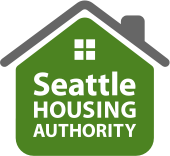SEATTLE—October 25, 2003—By early 2004, some residents of Seattle Housing Authority's public housing will face a new lease requirement to perform volunteer community services as a result of a Congressional mandate.
This controversial requirement was part of the Public Housing Reform Act of 1998, but up until this year, Congress had delayed its implementation. However, the latest HUD Appropriations Act signed on February 21, 2003, requires all housing authorities to implement this requirement for public housing residents.
Called the Community Service and Self-Sufficiency Requirement, this law says that low-income residents in public housing must contribute or participate for eight hours a month in a community service or a self-sufficiency activity or combination of both, as a condition of receipt of Federal housing assistance.
HUD defines community service as the performance of voluntary work or duties that are a public benefit, and that serve to improve the quality of life, enhance resident self-sufficiency, or increase resident self-responsibility in the community.
The law also requires that residents document their service and that the Housing Authority keep track of it for each resident. SHA has not received additional funding from HUD to implement this program.
There are a number of exemptions to the requirement, and activities that residents are already doing will qualify. For example, the following conditions qualify a resident for exemption:
- 62 years or older.
- Blind or disabled, or a primary caretaker of such.
- Employed.
- Involved in a state employment assistance program such as WorkFirst, Jobs Plus or Job Connection.
- Exempted from having to engage in a work activity under a State program.
SHA is currently in the process of sending letters to all public housing residents to notify them of this requirement. A team of SHA staff and community members are developing procedures that will determine how the requirement will be implemented and administered. SHA will individually notify residents whether or not they are exempt, and what they need to do in order to comply.
Because there is no funding accompanying this regulation, SHA views the requirement as an unfunded mandate. "We hope to implement this requirement in the spirit of our own mission, to increase self-sufficiency for people with low incomes, and we hope to do it in such a way that it is not a burden for our residents," said Executive Director Harry Thomas. "However, after reducing staff and programs due to funding cuts, administering this program will be very challenging."
